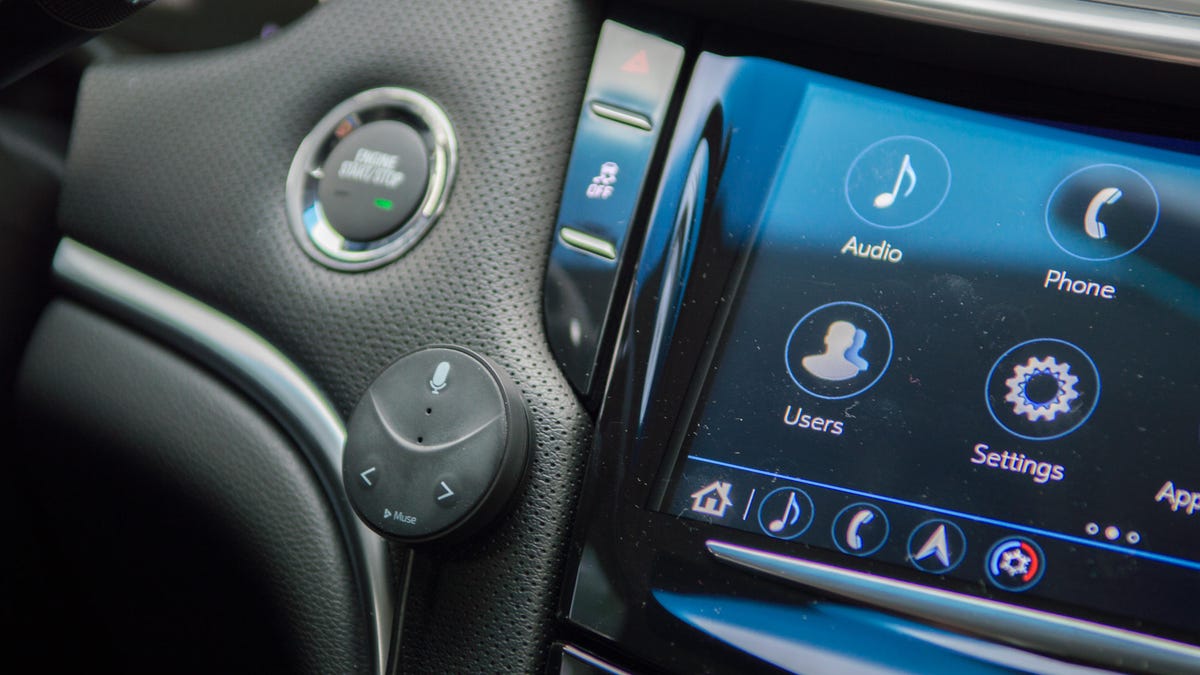Speak Music's Muse puts Alexa in the car, but I'm not sold quite yet
I can definitely see the benefits, but I still can't figure out whether or not it's a good idea.

As strange as it might seem, some companies are insistent that bringing more connectivity into the car can reduce distraction instead of increasing it. Speak Music is one of those companies, and its new Muse product brings Alexa into the car. The product is good based on my quick demo at CES 2018, but I'm still not sold on the notion that the solution as an idea is fully baked.
What is it?
Muse, which goes on sale Jan. 9, is essentially a powered dongle that adds Amazon Alexa capability to your car. All you need is a car with Bluetooth or an audio-in jack. And $69 (nice).
You'll download an app from either the App Store or Google Play and follow the instructions to set up your Muse, which basically means plugging it into a power source (USB or 12-volt) and getting the audio connected.
After that, you're good to go! Muse contains a microphone, so all you need to do is holler out to Alexa like you would at home with an Echo, give an instruction, and Bob's your uncle. After taking some time to process the request, your audio system will spring to life with the results -- again, just like any other device with Alexa.
The mounting solution is pretty slick, but it's unclear if the stick-on mount will leave any residue after being stuck on the dash for an extended period of time.
How well does it work?
After spending a period of time driving up and down Paradise Road in Las Vegas, I found the Muse to be a fully baked product, which you can't always say for products that come from crowdfunding programs.
The microphone never missed an "Alexa," and results were always related to the request. According to Muse, Amazon's team had an extensive testing period with the Muse to ensure it lived up to expectations for a device with official Alexa integration, so it shouldn't come as a surprise that it works perfectly.
Finding a spot for the Muse in your car isn't too tough, either. Muse mounts magnetically to a round dock that connects to your dashboard with an adhesive pad. The product still requires power, so you will have to deal with a cord, but Speak Music believes that it could solve this problem in the future with a larger version that has a rechargeable battery.
The only real problem is that all Muse responses must come from a single audio input, and in order for that to play on your speakers, your radio has to be tuned to that specific output. If you were listening to FM or satellite radio and had to ask a question, you'll have to shift your input to the correct one to hear the answer. But if you're listening to music through the Muse, then that obviously won't be a problem.
Muse eats up an entire audio channel, but if you're going to stream audio via Alexa, it won't be a problem.
Does it solve a problem or make it worse?
Here's where I'm torn on this. The Muse works very well, and for less than $70 it can add a great deal of connectivity to cars both new and old(ish). But I'm wondering whether or not it's necessary.
I'm not denying that some people lead very busy lives and need to ensure they're very much in tune with a schedule that could be fluid. Some folks will forget to bring home a gallon of milk unless Alexa reminds them. Adding Alexa to the car could very well save people time and effort.
But of all the places to offer more ways to stay connected, we choose the car? Distracted driving is already up, and despite cars being safer than ever before, crashes and fatalities are still on the rise. In fact, 2015 and 2016 provided the largest two-year increase in traffic deaths in more than half a century. Giving you more things to do in the car isn't going to help that, at least not based on how phones have already contributed to the above figures.
At the same time, you could bring up the point that doing just about anything through Alexa is safer than doing it through a standalone smart device. That's true, and I suppose it's unrealistic to just assume that people would ignore a phone instead of trying to accomplish whatever it is they need done.
But if you remove that part of the conversation, the Muse is quite good! It's a little involved with its physical cord and pairing process, and it requires a phone to act as an intermediary for getting your voice to the cloud and back, but if you can't possibly live without adding Alexa to your car, this is a good way to do it.
Your phone doesn't have to be on any specific screen while Muse is running, but it needs to be there to act as the shepherd between your requests and your answers.
Hyundai FCEV: We tackle 240 desert miles from LA to Vegas in Hyundai's new fuel cell prototype.
CES 2018: CNET's complete coverage of tech's biggest show.

